It is always interesting to me that the disciples, who we are told were trained fishermen, never catch anything unless they are with Jesus. Go through the Gospels and you will see that this is true. Their nets always come up empty until he gives the command to cast the nets. Then they can hardly bring in the catch because of the sheer number of fish they have caught. Today’s episode finds the disciples dejected, not sure where to go, ready to return to their former life and their former career. They have no idea what to do so they do what they always used to do … they go fishing. And it is Jesus once again who not only gives them the fish, but cooks breakfast for them. We too, are called to go fishing for the Lord in some way, but we’ll never catch anything if we go off on our own. Praise God that he is always willing to go fishing with us! Christ is risen! He is risen indeed! Alleluia!
Category: Easter
-
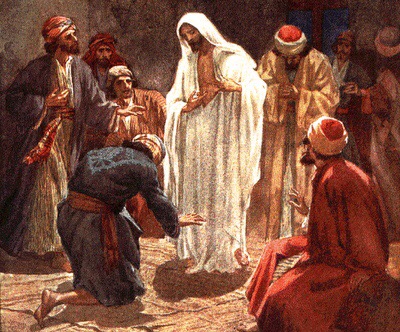
Easter Thursday
Today’s readings
Can you imagine how the disciples were feeling at this point? Prior to today’s Gospel selection, the women found the empty tomb, Peter has seen the Lord, and the two disciples had experienced him in the breaking of the bread on the way to Emmaus. Their minds were most likely reeling with excitement; trying to get a grip on the things he had said to them while he was still with them. I’m sure they were trying to figure out what all this meant, what they needed to do next.
Maybe that’s why the Lord’s initial words to them are “Peace be with you.” And apparently it didn’t work, because they think they’re seeing a ghost. After he eats some fish and speaks to them of the Scriptures, he sends them on mission with the words: “You are witnesses of these things.”
The peace that Jesus gives them is not the absence of conflict. That they will be witnesses to the fulfillment of the Scriptures will be anything but peaceful for them. They will have to make sacrifices – sacrifices of their very lives – to witness as Jesus calls them to, but there is no other choice. They are now beginning to understand the significance of what has happened among them, and they must go forward to do what they had been chosen to do.
When we have to make the decision to follow God’s call in our lives, we too will have to sacrifice. Not our lives, probably, but we will have to sacrifice our own comfort, our control over our own lives, our own point of view. But just like the disciples, we must remember what we have been chosen to do, and follow where we are being led.
We are witnesses of these things too, we are called to live and proclaim the Gospel. May we too receive the peace of Christ that we might focus on our call. -
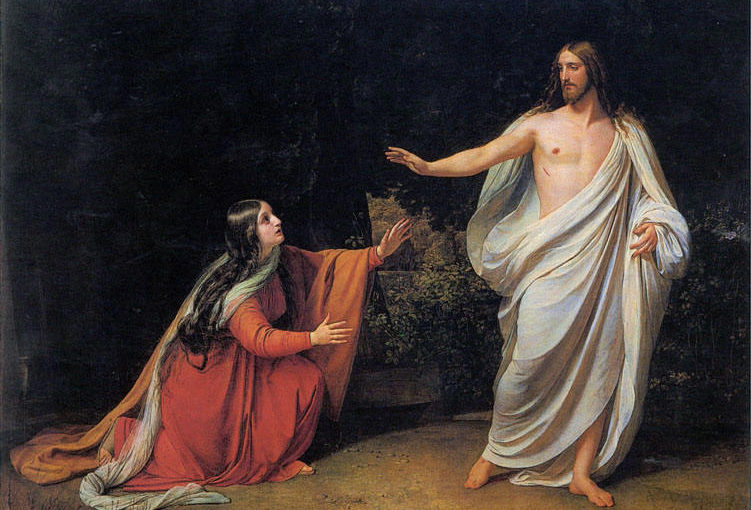
Easter Tuesday
Letting go of things is harder than we can sometimes even admit. I think that’s what was going on with Mary Magdalene. And we are just like her: we want to hold on to things and people as they are, because what is familiar is so very comfortable to us. I think sometimes that’s true regardless of whether the familiar is positive or negative. So many times we hold on to whatever we have and refuse to let them go because it’s as if we’re afraid we’ll be giving away some piece of ourselves. So then what happens is that we hang on to images of ourselves or other people in our life that are outdated, and stifle any room for growth. We hang on to resentments or past hurts and never give any chance for healing. We hang on to unhealthy relationships and never give ourselves a chance to break the cycle of pain they bring. We hang on to bad work situations and miss following our true calling.
What Mary needed to hear from Jesus in today’s Gospel was that she had to stop hanging on to things as they were, and to allow God’s promise to be fully revealed. The time for mourning was over, it was now time to rejoice and begin spreading the word that the Gospel was coming to its fruition. She had to begin that by going and spreading the word to the other disciples.
We too, have to stop grieving our past hurts and resentments and outdated notions of the world, ourselves and our relationships so that God’s promise can be fully revealed in us. The message of Easter joy means that we must begin that by spreading the news that Jesus is doing something new in us and in our world, and make sure that everyone knows about it. We can do that by examining our lives every day and reflecting on what God is doing in us and how we are responding to it. This is the kind of daily reflection that will help us to let go of what is unhelpful and grasp firmly to that which will lead us to Christ.
As we continue to live lives of conversion like this, we too can proclaim with Mary Magdalene on this Easter day, and every day, “We have seen the Lord!”
-
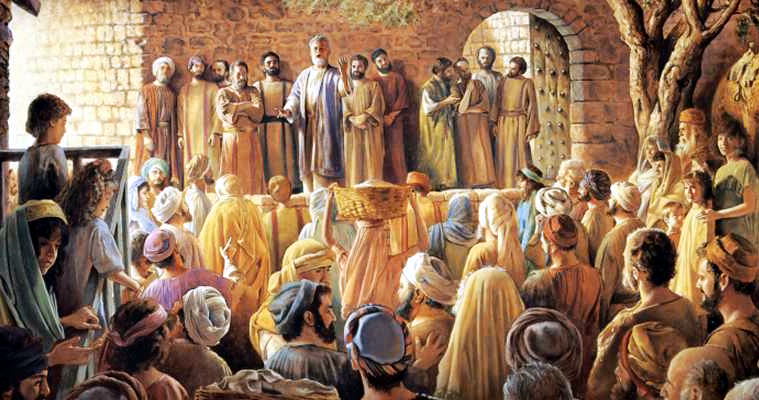
Easter Monday
Well, it wasn’t all that long ago that we saw the disciples scatter in fear, was it? Here they had seen their friend arrested, tortured, and killed, so one could not blame them for running scared. I’m sure I would have done no different if I had been them.
But in today’s first reading, we see them different. They have witnessed the resurrection of Jesus, they have seen him alive. More than that, they have been filled with the gift of the Holy Spirit, that great gift he had promised them all along. And so now they get it. Now they realize what he had been saying to them, and now they have courage and fortitude to proclaim the Gospel.
“God raised this Jesus, of this we are all witnesses,” Peter says on their behalf. They have entered into mystagogia … that time following a great event when those involved look back on what they have experienced, and come to new understandings based on those experiences. Their mystagogia of the Easter event has given them fresh hope and courage, and has empowered them to proclaim the message.
Here at Notre Dame, we saw our brothers Jett, Jordan and Clinton baptized. In addition, many were baptized into the Church and Christ Jesus throughout the world. They are all experiencing mystagogia in these days. They are looking back on their reception into full communion with us, and reflecting on what they have learned and how they have grown in their faith. We cradle Catholics also experience mystagogia in these days. Our baptisms are not as fresh in our minds as are the baptisms of our new brothers and sisters, but we recall with gratitude and profound joy the saving sacrifice that has given us hope of new life. So we too, like the apostles, are empowered to proclaim the message.
God has raised this Jesus from the dead, and we are witnesses of these things, brothers and sisters in Christ. Praise God! Christ is risen! He is risen indeed!
-
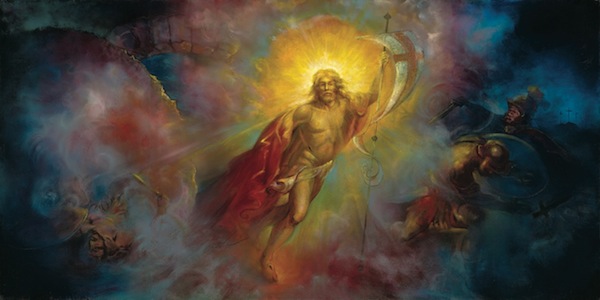
Easter Sunday of the Resurrection of the Lord
There’s certainly a flurry of activity in today’s readings, isn’t there? Especially in the Gospel, we see Mary Magdalene run from the empty tomb to get the Apostles. And then Peter and the “disciple whom Jesus loved” ran to the tomb. This flurry of activity centers around a crisis in their faith, a time of confusion that will ultimately lead to stronger faith.
So Mary comes to the tomb, early in the morning, while it is still dark. In St. John’s Gospel, the idea of light or dark always means something more than whether or not you can see outside without a flashlight. Often he is talking about light and darkness in terms of good and evil. That’s the way it was when we heard of Judas in Friday’s Passion reading: when he went out to do what he had to do, the Gospel says “and it was night.” That wasn’t just to record the time of day, it meant that we had come to the hour of darkness. But here when Mary comes to the tomb, I think the darkness refers to something else. Here, I think it means that the disciples were still in the dark about what was happening and what was going to happen.
Obviously, their confusion gives that away. Jesus had tried to tell them what was going to happen, but to be fair, what was going to happen was so far outside their realm of experience, that really, how could they have understood this before it ever happened? All they know is what Mary told them: the tomb is empty and she has no idea of where they have taken the Lord. And after all that had just happened with his arrest, farce of a trial, and execution, their heads had to be spinning. How could they ever know this was all part of God’s plan?
And even us – we who know that this was part of God’s plan – could we explain what was going on? Could we give a step-by-step picture of what happened when, and why? I know I couldn’t. But, like you, I take it on faith that, after Jesus died, the Father raised him up in glory. It’s a leap of faith that I delight in, because it is that leap of faith that gives me hope and promises me a future. How could we ever get through our lives without the grace of that hope? How could we ever endure the bad news that appears on our TV screens, in newspapers, and even closer to home, in our own lives – how could we endure that kind of news without the hope of the Resurrection?
And so, even though there is this flurry of kind of confused activity among the Apostles this Easter morning, at least this day finds them running toward something, rather than running away as they had the night of the Passover meal. They are running toward their Lord – or at least where they had seen him last, hoping for something better, and beginning with the “disciple whom Jesus loved,” coming to understand at last. It’s not night anymore for them. The day is dawning, the hope of the Resurrection is becoming apparent, the promise of new life is on the horizon.
And may this morning find us running too. Running toward our God in new and deeper ways. Running back to the Church if this has been the first visit you’ve made in a long while. Running back to families if you have been estranged. Running to others to witness to our faith both in word and in acts of service. We Christians have to be that flurry of activity in the world that helps the hope of the Resurrection to dawn on a world groaning in darkness. It’s not night anymore. The stone has been rolled away. This is the day the Lord has made!
Christ is risen! He is risen indeed! Alleluia!
-

The Easter Vigil in the Holy Night
We English-speakers have just one word for time, but other languages have more; those languages recognize the different kinds of time. Most notably for us, because it is reflected in the New Testament, the Greek language has two kinds of time: chronos and kairos. Chronos is the kind of time you can measure. It’s a day or a week or even the timeline of a project at work. Kairos on the other hand can be thought of as quality time: a summer afternoon spent with your family, a visit to a sick loved one, or a chance encounter with an old friend. This kind of time is mostly unmeasurable, and in some sense kairos is always “now.”
It’s important to keep these kinds of time in mind because the world sometimes sees time in a rather cynical way. But that’s not how our God sees time. Did you hear what we prayed at the very beginning of tonight’s vigil? Listen again: “Christ yesterday and today, the beginning and the end, the Alpha and the Omega, all time belongs to him, and all the ages, to him be glory and power through every age and for ever. Amen.” And these are important, even brave words for us to offer on this most holy night. Tonight’s vigil proclaims that all time is holy, sanctified by our God who has walked with us through our yesterdays, remains with us today, and forges on with us toward our tomorrows. There is not a single moment of our life, not a single moment of our history that is not holy because every moment has been, is now, and always will be imbued with the presence of our God who is holiness itself. That’s what we gather to celebrate on this most holy night.
But as we have walked through Lent, and especially through this Holy Week, there may even be a temptation, I think, to come to think that the world, and especially human history, was a creative experiment that went horribly wrong, that God sent his Son to clean up the mess only to have him killed for it, and then in a last move of desperation raised him up out of the grave. But we know that’s not how this works. Salvation was not some kind of dumb luck or happy accident. The salvation of the world had been part of God’s creative plan all along. Humanity, given the grace of free will had, and has, certainly gone astray. But God did not create us simply to follow our own devices and end up in hell. He created us for himself, and so sent his Son Jesus to walk our walk, to die our death, and to rise up over it all in the everlasting promise of eternal life. That’s what we celebrate on this most holy of all nights.
There is a cynical view of our world that would have us believe that everything is futile and that the only possible way to endure this world is to cultivate a kind of cynical apathy that divorces us from our God, our loved ones, our communities and our world. We are conditioned to believe that time, and life itself, is meaningless, that there is nothing worth living for, and certainly nothing worth dying for. But tonight’s vigil debunks all of that. Tonight we are assured by our God that our present is no less redeemable than was our past, nor is it any less filled with promise than is our future.
Tonight we have heard stories of our salvation, God’s saving action in the world throughout all time. Each of our readings has been a stop in the history of God’s love for us. God’s plan for salvation, and his sanctification of time, began back at the beginning of it all. Each of the days was hallowed with precious creation, and all of it was created and pronounced good. Then Abraham’s faithfulness and righteousness earned us a future as bright as a zillion twinkling stars. Later, as Moses and the Israelites stood trapped by the waters of the red sea, God’s providence made a way for them and cut off their pursuers, making the future safe for those God calls his own. The prophet Isaiah calls us to seek the Lord while he may be found, not spending our lives on things that fail to satisfy, but investing in our relationship with God that gives us everything. The prophet Ezekiel foretells the recreation all humanity will experience as they come to know Christ and are filled with the Spirit. St. Paul rejoices in the baptism that has washed away the stains of sin as we have died and risen with Christ, and has brought us into a new life that leads ultimately to God’s kingdom. And finally, our Gospel tonight tells us not to be afraid, to go forth into the Galilee of our future and expect to see the Lord.
We Christians have been spared the necessity of a cynical view of the world and its people. Our gift has been and always is the promise that Jesus Christ is with us forever, even until the end of the world. And so, just as God sanctified all of time through his interventions of salvation, so too he has sanctified our lives through the interventions of Sacrament. We are a sacramental people, purified and reborn in baptism, fed and strengthened in the Eucharist, and in Confirmation, set on fire to burn brightly and light up our world. Tonight we recall these three Sacraments of Initiation and recommit ourselves to the promises of our baptism. Also, for the first time since Thursday, we have the opportunity to celebrate the Eucharist together, drawing strength from the food our God provides.
These days of Lent have been a sanctifying journey for all of us, as we have walked the Stations of the Cross together, fasted together, celebrated the sacraments, reflected on living the Eucharist, gathered food for the food pantry, and so much more. Christ has definitely sanctified this Lenten time for all of us, and has now brought us to the fullness of this hour, when he rises over sin and death to bring us all to the promise of life eternal.
And it is this very night that cleanses our world from all the stains of sin and death and lights up the darkness. The Exsultet, the Easter Proclamation that I sang when we entered Church tonight, tells us: “This is the night of which it is written: The night shall be as bright as day, dazzling is the night for me, and full of gladness. The sanctifying power of this night dispels wickedness, washes faults away, restores innocence to the fallen, and joy to mourners, drives out hatred, fosters concord, and brings down the mighty.” What a gift this night is, not just to us gathered here in this church, not just to all the Catholics gathered together throughout the world on this holy night, but to all people in every time and place. Our world needs the light and our time needs the presence of Christ, and our history needs salvation. Blessed be God who never leaves his people without the great hope of his abiding presence!
And so, having come through this hour to be sanctified in this vigil, we will shortly be sent forth to help sanctify our own time and place. Brightened by this beautiful vigil, we now become a flame to light up our darkened world. That is our ministry in the world. That is our call as believers. That is our vocation as disciples. “May this flame be found still burning by the Morning Star. The one Morning Star who never sets, Christ your Son, who coming back from death’s domain, has shed his peaceful light on humanity, and lives and reigns forever and ever. Amen.”
Christ is risen! He is risen indeed! Alleluia!
-
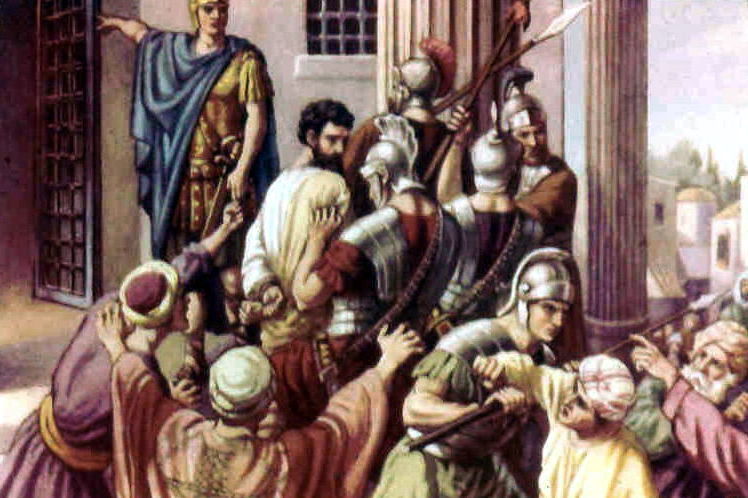
Tuesday of the Seventh Week of Easter
Today’s first reading and Gospel present a kind of wrap-up to the lives of St. Paul and Jesus, respectively. They both have completed the mission for which they had been sent, and both are now giving the mission back to God who would continue it as He alone saw fit. Paul’s mission had been one of conversion, beginning with his own, and then reaching out to the Gentiles he met traveling far and wide. Now he did not know what would happen to him, only that the Holy Spirit kept telling him it was to be an end filled with hardship, from which Paul refused to shrink.
Jesus, one with the Father from the beginning, had come from the Father and was now going back to the Father. He brought God’s love to bear on the aberrations of sin and death and had drawn disciples into the mission to continue the work. It could not continue unless he returned to the Father and sent the Holy Spirit upon them. Doing that has brought the Gospel into every nation and into the lives of millions. He too faced an end filled with hardship, from which he refused to shrink.
We disciples will come to our own ends as well. Will we too be able to give the mission back to the Father, confident that we’ve done it as best we could, and confident that it would be continued as God saw fit? Have our days sometimes been filled with hardship, and if so, have we also refused to shrink from it? We disciples are part of the mission that God has in the world. We take it for a time and will eventually have to hand it back over. Please God, may we all be able to do so with confidence that God’s will has been done in us!
-
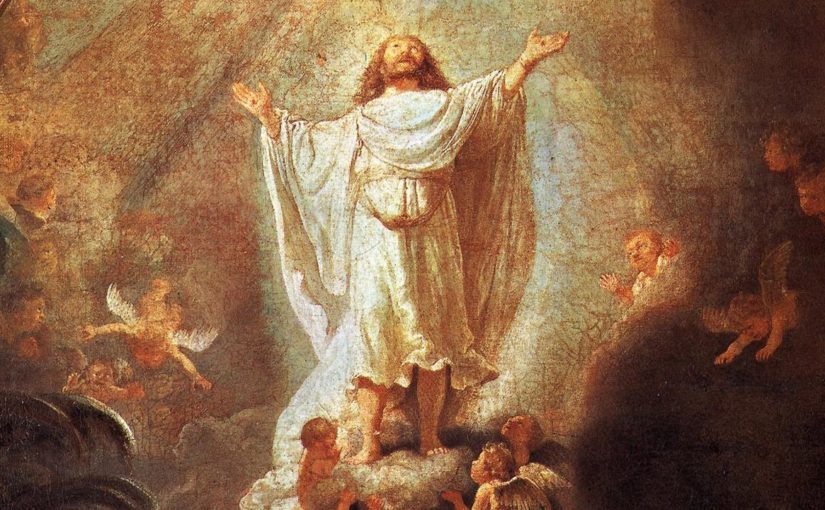
The Ascension of the Lord
For the early Apostles and disciples, today’s feast had to be a kind of “now what?” experience for them. Think about what they’ve been through. Their Lord had been betrayed by one of their friends, he had been through a farce of a trial and put to death in a horrible, ignoble way, they had been hiding in fear thinking they might be next, they had questioned what they were supposed to do without their Lord, and then they witness the Resurrection: Christ walks among them for a time, appearing to them and making himself known. They had seen redemption of a way of life they almost had abandoned, and now, on this feast of the Ascension, their Lord is leaving them again. In our first reading from the Acts of the Apostles, you can almost feel the amazement and desperation they are experiencing as they stare up into the heavens, incredulous that their Lord is gone, again.
So once again, God sends two messengers, two men in white garments, to set them straight. God had sent two men in dazzling garments to the women at the tomb on the day of the Resurrection as well. That time, the men reassured the women that the Lord had not been moved or stolen, but had risen from the dead. This time, the men appear to the Apostles, assuring them that the Lord would return in the same way as he had just departed from their sight. Both times, it was the same kind of messengers, with the same kind of hopeful message. Go forward, don’t worry, God is in control.
One of the great themes of Catholic theology is the idea of “already, and not yet.” Basically, that means that we disciples of Christ already have a share in the life of God and the promise of heaven, but we are not yet there. So we who believe in Jesus and live our faith every day have the hope of heaven before us, even if we are not home yet. And this hope isn’t just some “iffy” kind of thing: it’s not “I hope I’ll go to heaven one day.” No, it’s the promise that because of the salvation we have in Christ, we who are faithful will one day live and reign with him. This gives us hope in the midst of the sorrows that we experience in this world.
Another great theme of Catholic theology is that our God is transcendent, but also immanent. Transcendent means that our God is higher than the heavens, more lofty than our thoughts and dreams, beyond anything we can imagine. Whatever we say about God, like “God is love” or “God is good” – those things only begin to scratch the surface of who God is, because God is transcendent beyond anything our limited words can describe. But our God is also immanent. God is not some far off entity that has brought the world into existence and set the events of our lives in motion and then drops back to observe things from afar. No, our God is one who walks among us and knows our sorrow and our pain and celebrates our joy. Saint Augustine said that God is nearer to us than we are to ourselves. Our God may indeed be mysterious and beyond us, but he is also the one we can reach out and touch. If that weren’t so, the Eucharist would be pretty meaningless.
As you can see, Catholic theology is generally speaking not exclusive. We are not either already sharing in the promise or not yet sharing in it, but we are “already and not yet.” Our God is not either transcendent or immanent, but both transcendent and immanent. These two great theological themes come to a kind of crossroads here on this feast of the Ascension.
Today, as Christ ascends into heaven, our share in the life of God and the promise of heaven is sealed. We have hope of eternal life because our Lord has gone before us to prepare a place for us. If he had not gone, we could never have shared in this life. So, although Jesus has left the apostles yet again, they can rejoice because they know that the promise is coming to fulfillment. We do not possess it yet, because we are not home yet, but we share in it already, because Christ is our promise.
Today, as Christ ascends into heaven, he once again, with the Father, is transcendent, because we, along with the Apostles, can no longer see him. But he remains immanent by his promise to be with us always. Again, I will quote St. Augustine who said of Christ that “He did not leave heaven when he came down to us; nor did he withdraw from us when he went up again into heaven. The fact that he was in heaven even while he was on earth is borne out by his own statement: No one has ever ascended into heaven except the one who descended from heaven, the Son of Man, who is in heaven.” St. Augustine teaches that the notion of time is that everything is present to God all at once. This explains how our celebration of the Eucharist in a few minutes brings us to Calvary at the moment when Jesus gave his life for us. And it explains how Jesus can ascend into heaven and yet remain among us. Time is a limitation for us humans, but not for God who created time in the first place.
All of this theology can be heady stuff, but what it boils down to is this: because Jesus died, rose from the dead, and ascended into heaven, we now have the hope of heaven and of sharing in the very life of God. Even though we do not possess heaven yet, we know that it belongs to all who have faith in Christ and live that faith every day. And even though we do not see Jesus walking among us, he is still absolutely present among us and promises to be with us forever. The preface to the Eucharistic prayer which I will sing in a few minutes makes this very clear; it says:
Mediator between God and man,
judge of the world and Lord of hosts,
he ascended not to distance himself from our lowly state
but that we, his members, might be confident of following
where he, our Head and Founder, has gone before.Jesus, having explained the Scriptures to his Apostles yet again, tells them “You are witnesses of these things.” And so they don’t have the luxury of just standing there, staring up into the sky for hours, dejected and crushed because the One who had been their hope had disappeared. No, as the Gospel tells us today, they “returned to Jerusalem with great joy, and they were continually in the temple praising God.” They are witnesses, “clothed with power from on high,” and they must be filled with the hope and joy of the resurrection and ascension of the Lord.
We disciples are witnesses of these things too. We must witness to a world filled with violence and oppression and sadness that our God promises life without end for all those who believe in him. And we have that hope already, even though not yet. We must witness to a world languishing in the vapidity of relativism and individualism and New Age Oprah and Dr. Phil philosophy that it is Jesus Christ, the Lord of All, who is one with us in heaven, and present among us on earth, who fulfills our hopes and longings and will never leave us. We must be witnesses to all these things, living with great joy, continually praising God because Christ’s ascension is our exaltation. We too might hear those men in dazzling white garments speak God’s words of hope to us: go forward, don’t worry, God is in control.
-
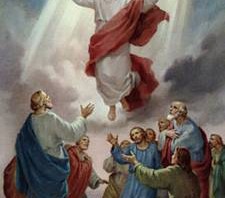
The Ascension of the Lord – Alternate
“You are witnesses of these things.”
That is what Jesus tells the disciples at the close of today’s Gospel reading. He is just about to ascend to the Father, and so he takes care to make sure that the disciples are ready for the mission. They are the ones who will have to testify to the death and resurrection of Christ, and to preach forgiveness of sins in his name to every person on earth.
And we can see that the disciples did indeed take up this mission. If that were not true, we would not be here right now. The Word has been proclaimed, the sacraments have been handed down, and we have benefitted from it.
And so now we are the witnesses of these things. We may not have seen the events unfold in front of us, but we have seen them in the Liturgy, and we believe that our celebration of the Liturgy is not some simple re-enactment of the events of our salvation, but in a very real sense is a participation in the death and resurrection of Christ in our own day.
We are the witnesses now. And people have to see us preaching with the way that we live our lives. We have to preach it by going to Mass faithfully, by keeping the commandments, by being people of integrity and fairness at our jobs or in our schools, by reaching out to those who are poor, needy and marginalized, by giving ourselves to others whenever, wherever, and however we can.
We are witnesses of these things. The question is, will others witness Christ in us?
-
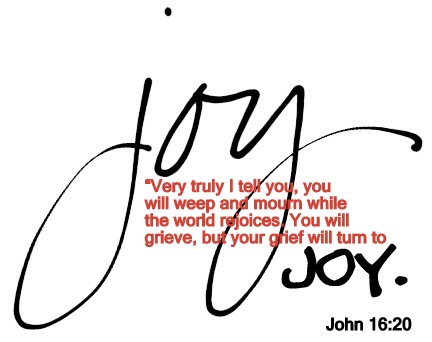
Thursday of the Sixth Week of Easter
“You will weep and mourn, while the world rejoices;
you will grieve, but your grief will become joy.”Jesus continues to prepare his disciples for his not being among them in the flesh. He knows that his death, resurrect and Ascension were all part of the plan, and he wants the disciples to be prepared so that their grief does not overwhelm the mission. He knows that they will indeed grieve, after all, he was fully human in that way too. He grieved over the death of Lazarus and grieved over the needs of the people he ministered to. He knew that sadness was to be expected and please note carefully that he did NOT tell them not to grieve: “You WILL weep and mourn, while the world rejoices; you WILL grieve…” So he does not, as our modern society would, tell them to get over it and get back to work. He knows that grief is healthy and necessary.
But he also gives them hope. Because we Christians do not grieve as if we have no hope. He knows that salvation is the plan, and that death is no longer the end of the story. Their grief would indeed become joy. And joy isn’t the same thing as saying they would always be happy. But just because people grieve doesn’t mean they are not experiencing joy. Because joy is a condition that is not regulated by external circumstances. Joy comes from knowing that God is in control and that salvation is ours.
Joy ultimately comes from the Holy Spirit, the Advocate that Jesus knew for certain he would be sending once he returned to the Father. The Spirit’s presence in our lives gives us a joy that the world and all its grief cannot ever take away. We too look forward to these events as we prepare for our annual celebrations of the Ascension and Pentecost. We may indeed be subject to grief in this life, in many forms. But we have been given the gift of the Spirit, we know that God is in control and that salvation is ours.
We may indeed weep and mourn while the world rejoices; we may grieve, but our grief will certainly become joy.
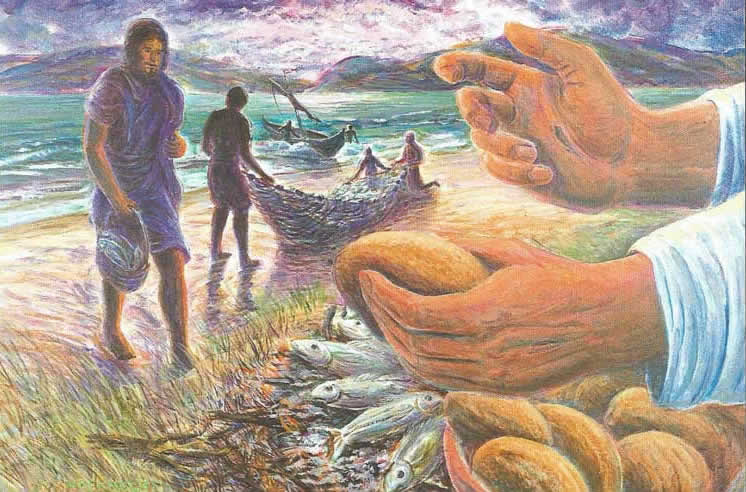
You must be logged in to post a comment.